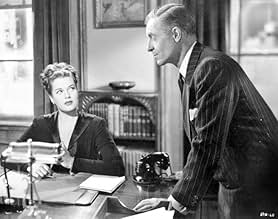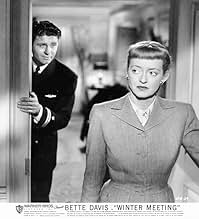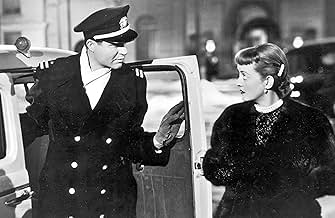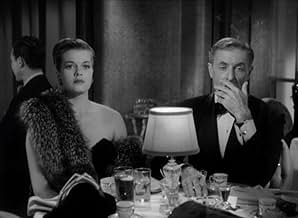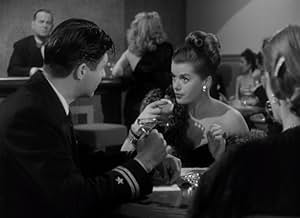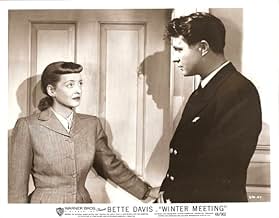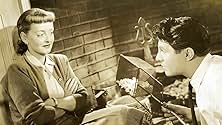AVALIAÇÃO DA IMDb
6,2/10
1,6 mil
SUA AVALIAÇÃO
Adicionar um enredo no seu idiomaBette Davis is a successful poetess who falls in love with a war hero in this romantic melodrama that is a moving film experience any time of year.Bette Davis is a successful poetess who falls in love with a war hero in this romantic melodrama that is a moving film experience any time of year.Bette Davis is a successful poetess who falls in love with a war hero in this romantic melodrama that is a moving film experience any time of year.
- Direção
- Roteiristas
- Artistas
Jim Davis
- Slick Novak
- (as James Davis)
Woody Herman
- Leader - Woody Herman and His Orchestra
- (as Woody Herman and His Orchestra)
Lois Austin
- Marcia
- (não creditado)
Tex Brodus
- Restaurant Patron
- (não creditado)
Gertrude Carr
- Woman on Subway
- (não creditado)
Steve Carruthers
- Restaurant Patron
- (não creditado)
Douglas Carter
- Waiter
- (não creditado)
Hugh Charles
- Headwaiter
- (não creditado)
Russ Clark
- Man in Cafe
- (não creditado)
Franklyn Farnum
- Restaurant Patron
- (não creditado)
Bess Flowers
- Restaurant Patron
- (não creditado)
Charles Fogel
- Restaurant Patron
- (não creditado)
- Direção
- Roteiristas
- Elenco e equipe completos
- Produção, bilheteria e muito mais no IMDbPro
Avaliações em destaque
This is a much more than your typical Bette Davis melodrama. Here, Davis plays a NYC poetess (Susan Grieve), who runs around in high social circles. One of her society friends, Stacy Grant (John Hoyt), invites her to dine with him as he entertains a navel hero, Slick Novak (Jim Davis, Jock Ewing from TV's Dallas) who is staying briefly in town. Stacy's idea was to make Susan his date while pairing Novak up with his secretary, Peggy Markham (Janis Paige). However, the evening doesn't go as planned, since Novak falls for Susan rather than Peggy and invites himself into Susan's house after the evening's entertainment.
In spite of Susan and Novak not hitting it off too well at first, they start to talk. They soon discover--after driving to Susan's family farm in CT--that they each have unresolved issues from their past. Susan's problem has to do with her dead father; how her mother had treated him which lead him to commit suicide.
Susan never forgave her mother for her cheapness. However, Novak's insistence that Susan had not tried to see her mother's side of the issue leaves Susan to question her own beliefs.
Novak's unresolved issue is spiritual in nature. Since he had been 16, he had always felt a strong need to enter the priesthood and had been discouraged from this by talking to a priest before entering the Navy.
The two help each other to resolve these some of these issues. In the end, this is not so much of a romantic story between a man and a woman as it is a mutual guidance about leading each other to spiritual epiphanies (or sudden moments of soulful clarity) of how to proceed with their lives.
P.S. This is one of those movies in which the two leading co-stars stare the last name: Davis & Davis.
In spite of Susan and Novak not hitting it off too well at first, they start to talk. They soon discover--after driving to Susan's family farm in CT--that they each have unresolved issues from their past. Susan's problem has to do with her dead father; how her mother had treated him which lead him to commit suicide.
Susan never forgave her mother for her cheapness. However, Novak's insistence that Susan had not tried to see her mother's side of the issue leaves Susan to question her own beliefs.
Novak's unresolved issue is spiritual in nature. Since he had been 16, he had always felt a strong need to enter the priesthood and had been discouraged from this by talking to a priest before entering the Navy.
The two help each other to resolve these some of these issues. In the end, this is not so much of a romantic story between a man and a woman as it is a mutual guidance about leading each other to spiritual epiphanies (or sudden moments of soulful clarity) of how to proceed with their lives.
P.S. This is one of those movies in which the two leading co-stars stare the last name: Davis & Davis.
"Winter Meeting" is a film that doesn't add anything to Bette Davis' distinguished career in the movies. The melodrama is undermined by a completely miscast Jim Davis, who makes the picture worse than it deserved to be. The part of Slick Novak should have gone to another actor that could have added a few more sparks to the movie.
As directed by Bretaigne Windust, "Winter Movie" is a dull attempt to bring the novel in which it's based to the screen. The adaptation leaves a lot to be desired.
The basic problem with the film is one of credibility. We don't believe, for one second, Slick Novak, the hero Navy lieutenant would even look at Susan Grieve at all, let alone be romantically involved with her. It's easy for us to understand why Susan would make a fool of herself in letting Slick come into her life. After all, plain Susan was no competition for gorgeous Peggy, who is all over Slick at the night club, and clearly wants him.
Stacy Grant, the man about town, kept reminding us of a subdued Waldo Lydecker, from "Laura", in the way he tries to get Susan under his influence. He wants to expose her to a society that she doesn't care to belong. This role was one of the ways Hollywood dealt with the subject of homosexuality in those days. Everyone knew about them, but the movie making people wanted to keep Stacy and his ilk in a permanent closet.
Bette Davis underplays Susan with mixed results. Obviously, Ms. Davis had no influence for getting out of this second class melodrama unworthy of her talent. Then again, one questions her wisdom in letting a light weight actor like Jim Davis play opposite her, when it's clear he is not in her league.
The wonderful John Hoyt makes the best out of Stacy Grant and Florence Bates, one of the best character actresses of that era, is fine as the housekeeper who knows a lot about the mistress of the house. Janis Paige, in all her beauty and youth, doesn't have much to do.
This is a film to be seen as a curiosity more than a Bette Davis signature vehicle.
As directed by Bretaigne Windust, "Winter Movie" is a dull attempt to bring the novel in which it's based to the screen. The adaptation leaves a lot to be desired.
The basic problem with the film is one of credibility. We don't believe, for one second, Slick Novak, the hero Navy lieutenant would even look at Susan Grieve at all, let alone be romantically involved with her. It's easy for us to understand why Susan would make a fool of herself in letting Slick come into her life. After all, plain Susan was no competition for gorgeous Peggy, who is all over Slick at the night club, and clearly wants him.
Stacy Grant, the man about town, kept reminding us of a subdued Waldo Lydecker, from "Laura", in the way he tries to get Susan under his influence. He wants to expose her to a society that she doesn't care to belong. This role was one of the ways Hollywood dealt with the subject of homosexuality in those days. Everyone knew about them, but the movie making people wanted to keep Stacy and his ilk in a permanent closet.
Bette Davis underplays Susan with mixed results. Obviously, Ms. Davis had no influence for getting out of this second class melodrama unworthy of her talent. Then again, one questions her wisdom in letting a light weight actor like Jim Davis play opposite her, when it's clear he is not in her league.
The wonderful John Hoyt makes the best out of Stacy Grant and Florence Bates, one of the best character actresses of that era, is fine as the housekeeper who knows a lot about the mistress of the house. Janis Paige, in all her beauty and youth, doesn't have much to do.
This is a film to be seen as a curiosity more than a Bette Davis signature vehicle.
Possible *Spoiler*
What I liked about this film was the dialogue. Yes, the dialogue. To me, this film was about two people who were struggling with their inner desires, disappointments, hurts and longings. Both main characters were somewhat stiff in social situations. The uneasiness between them was understandable to me because of their past experiences.
The romantic scenes were awkward in my opinion because of a spinster who is within her shell; and a man struggling with his inner desire to be a priest. Plus it appears the characters were two introverts.
Yes indeed, the film was slow moving, just like real life is sometimes. I do not mind slow moving films, for films should not always be about speed and excess of excitement. There were some really good moments in this film. If you do not mind a story unfolding slowly, with an emphasis on dialogue, check out this film.
What I liked about this film was the dialogue. Yes, the dialogue. To me, this film was about two people who were struggling with their inner desires, disappointments, hurts and longings. Both main characters were somewhat stiff in social situations. The uneasiness between them was understandable to me because of their past experiences.
The romantic scenes were awkward in my opinion because of a spinster who is within her shell; and a man struggling with his inner desire to be a priest. Plus it appears the characters were two introverts.
Yes indeed, the film was slow moving, just like real life is sometimes. I do not mind slow moving films, for films should not always be about speed and excess of excitement. There were some really good moments in this film. If you do not mind a story unfolding slowly, with an emphasis on dialogue, check out this film.
Bette Davis stars as lonely NYC poetess Susan Grieve. Her best friend Stacy (John Hoyt) asks her to accompany him on a blind double date along with visiting war hero Slick Novak (Jim Davis) and Stacy's secretary Peggy (Janis Paige). The sparks are immediate between Susan and Slick, and they spend a snowy weekend together in the country where they both confront deep-seated issues.
Bette Davis is dependably good, but Jim Davis is one of the worst regularly-employed actors in Hollywood history. Watching him struggle through his lines is almost as painful as it is humorous. When his character finally reveals his "dark secret", it elicited a chuckle rather than a gasp, which I don't think was the intention. The film's high point is a surprisingly open performance by John Hoyt as the proverbial "gay best friend" from countless future romance films. Of course it's never explicitly stated that Hoyt's Stacy is gay, given this is still the production code era. It's not a mocking or condescending performance, either, which is doubly surprising for the time. Some of the dialogue between he and Davis has a pre-Code vibe, rich in double entendre. If only his character had been in service of a better story and movie.
Bette Davis is dependably good, but Jim Davis is one of the worst regularly-employed actors in Hollywood history. Watching him struggle through his lines is almost as painful as it is humorous. When his character finally reveals his "dark secret", it elicited a chuckle rather than a gasp, which I don't think was the intention. The film's high point is a surprisingly open performance by John Hoyt as the proverbial "gay best friend" from countless future romance films. Of course it's never explicitly stated that Hoyt's Stacy is gay, given this is still the production code era. It's not a mocking or condescending performance, either, which is doubly surprising for the time. Some of the dialogue between he and Davis has a pre-Code vibe, rich in double entendre. If only his character had been in service of a better story and movie.
In many ways, this film is a nice departure from the typical Bette Davis film. Having her play a not particularly attractive spinster who is reluctant in love is a nice idea. For once, the "plain Jane" in the film gets the man while the sexy vamp is left in the cold--and I appreciate this. Plus, the film talks a lot about psychological motivations and struggles--as both leads are extremely screwed up and are emotionally "stuck". However, despite these decent story ideas, the film manages to never really hit the mark. This is possibly due to the film packing in too many plot points, or it might be because the film ends on a down note or it could be because the male lead was an unknown and didn't especially distinguish himself. All I know is that the film did keep my attention but I just never felt satisfied by much of it--except the final phone call Bette makes as the film concludes.
For huge Davis fans like myself, it's worth seeing. For those who aren't, please try some of her great films first--she was an amazing and great actress and this movie might give you the impression she was just ordinary.
Two final observations. First, in a cliché that I hate but is present in so many films, a round of drinks is bought and no one really drinks any of it! If I were paying about $5 a drink, I'd be sure to drink mine AND I might be tempted to drink all the other drinks--after all, this costs money!! Second, if you see the film, watch John Hoyt's performance and then ask yourself if this role didn't seem exactly the sort you'd normally see Clifton Webb play. It's got "Webb" written all over it!
For huge Davis fans like myself, it's worth seeing. For those who aren't, please try some of her great films first--she was an amazing and great actress and this movie might give you the impression she was just ordinary.
Two final observations. First, in a cliché that I hate but is present in so many films, a round of drinks is bought and no one really drinks any of it! If I were paying about $5 a drink, I'd be sure to drink mine AND I might be tempted to drink all the other drinks--after all, this costs money!! Second, if you see the film, watch John Hoyt's performance and then ask yourself if this role didn't seem exactly the sort you'd normally see Clifton Webb play. It's got "Webb" written all over it!
Você sabia?
- CuriosidadesThis film was a huge box office failure, bringing in less than half the cost of production and promotion. It was Bette Davis's biggest flop at Warner Bros. and came after Que o Céu a Condene (1946), another money-loser for the studio, causing Jack L. Warner to lose faith in Davis's box office appeal.
- Erros de gravaçãoWhen Stacey goes to Susan's apartment at the beginning of the film, he takes off a light-colored scarf. When he goes to leave, he puts on a much different and dark-colored scarf.
- Citações
Stacy Grant: [to Peggy] Let me give you a piece of advice, culled from years of devestating experience. Next to loss of money, deafness, and skin disease, passion can be the most dangerous.
- ConexõesFeatured in AFI Life Achievement Award: A Tribute to Bette Davis (1977)
- Trilhas sonorasIf I Could Be with You
(uncredited)
Music by James P. Johnson
Played when Susan and Stacey arrive at the restaurant
Principais escolhas
Faça login para avaliar e ver a lista de recomendações personalizadas
Detalhes
- Data de lançamento
- País de origem
- Idioma
- Também conhecido como
- Winter Meeting
- Locações de filme
- Empresa de produção
- Consulte mais créditos da empresa na IMDbPro
Bilheteria
- Orçamento
- US$ 1.927.000 (estimativa)
- Tempo de duração
- 1 h 44 min(104 min)
- Cor
- Proporção
- 1.37 : 1
Contribua para esta página
Sugerir uma alteração ou adicionar conteúdo ausente


